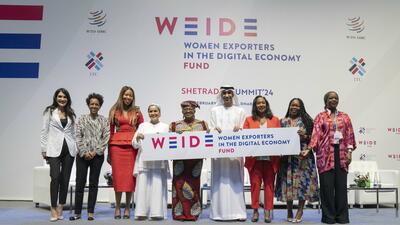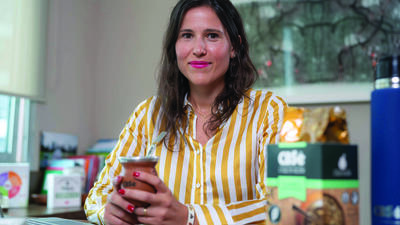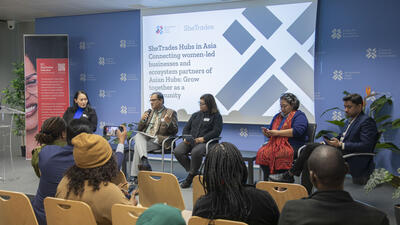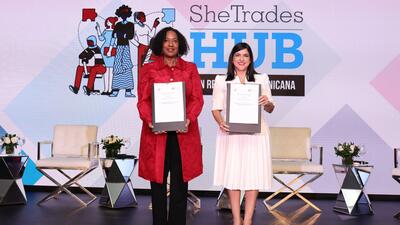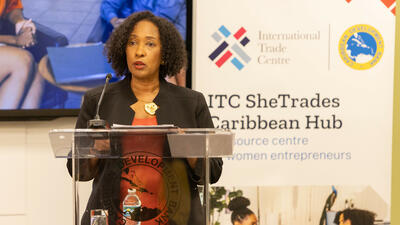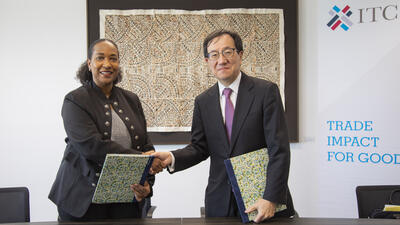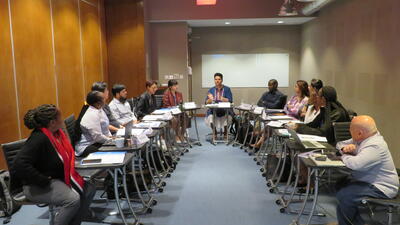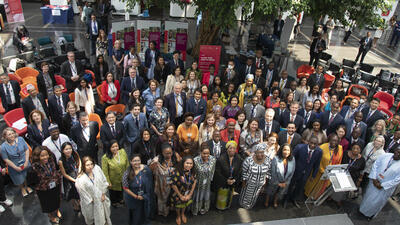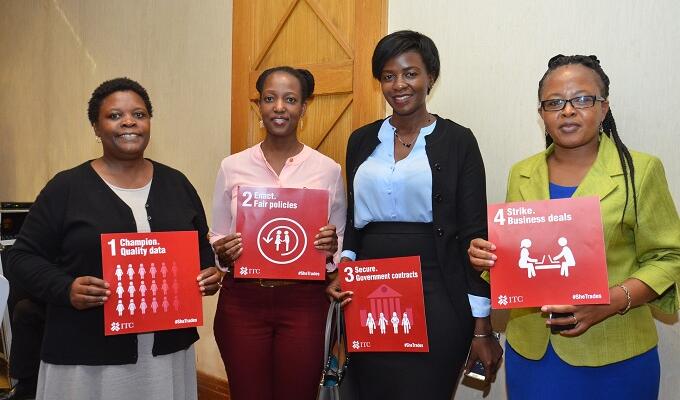

Connecting women to markets through SheTrades
ITC’s flagship initiative for women entrepreneurs marks its two-year anniversary
The SheTrades initiative, which aims to connect one million women entrepreneurs to the market by 2020, was launched just over two years ago. It is the International Trade Centre’s (ITC) main vehicle to support Goal 5 of the United Nations 2030 Agenda for Sustainable Development, to empower all women and girls.
The SheTrades initiative evolved from ITC’s Women and Trade programme, which since 2016 has focused on creating opportunities for women in trade. It aims to foster change by going beyond the traditional approach of merely improving the quality of women’s products and services. Instead it sets out to engage all actors involved in women’s economic empowerment including governments, the private sector and civil society. All have critical roles to play.
Today the SheTrades initiative works directly with 15,000 women entrepreneurs through a plethora of ITC projects and programmes. In Kenya, Indonesia and Sri Lanka, women in the services sectors are connected to regional and global market opportunities. In the Pacific, women handicraft producers are trained to improve their produce and linked to high-end fashion designers. Across the coffee sector in eastern and central Africa, ITC works with several associations to help women farmers and producers meet international quality standards.
Partnerships are crucial to increasing the reach, quality and sustainability of the SheTrades initiative. So far, teaming up with different partners has ensured support for some 200,000 women entrepreneurs. For example, in Kenya ITC has teamed up with Barclays Bank to provide finance to women entrepreneurs and ensure access to markets. So far the bank has already made available more than over $3 million worth of loans to 120 SheTrades entrepreneurs.
Meanwhile, working with eBay, the global online retailer, more than 100 selected women entrepreneurs are receiving support to expand their businesses and improve their digital commerce capabilities. Support provided by eBay to the SheTrades include in-depth training on market skills, mentoring on digital commerce and a full-fledged eBay shopfront for a period of one year for half of the 100 selected companies).
Partnerships with governments matter, too. Together with Sierra Leone and Iceland, ITC has been leading the Trade Impact Working Group of World Trade Organization member states to develop the Buenos Aires Declaration on Trade and Women’s Economic Empowerment. This commits signatories to include an increase their focus on gender in trade policy and galvanizes stakeholders to take action to boost economic growth worldwide. This again can help create more and better-paid jobs for women.
By the time the Declaration was presented to the WTO at its Ministerial Conference in December 2017, more than 120 World Trade Organization (WTO) members and observers had signed the declaration.
However, building and ensuring the success of the SheTrades initiative has not been straightforward.For ITC, the growth of the initiative required some soul-searching: is the organization equipped to create an ecosystem of solutions that empower women economically? Does it have the knowledge and resources required to lead on issues concerning the intersection of gender and trade?
Despite initial growing pains, the SheTrades initiative is now delivering results and impacts for women entrepreneurs.
Take for example Chiedza Makonnen. She is the founder of Afrodesiac Worldwide, a Ghanaian fashion brand and a SheTrades entrepreneur. Following participation in training provided by several SheTrades partners, was exposed to international platforms and has since conquered the European market with her contemporary Afro-Urban style clothing line.
Makonnen’s business philosophy is also aligned to the thinking behind the SheTrades initiative. For her, it is imperative to contribute to the manufacturing industry in Ghana. A fully 80% of the fabrics used in her production are produced in Africa and 99.9% of those suppliers are women artisans working in impoverished areas. Growing her business means that she contributes to improving livelihoods in her local community as well.
Makonnen started her business with a few female employees at the micro-production level. As a SheTrades beneficiary, she was able to receive support, which enabled her to scale up her production and employ more people. More importantly, Makonnen is now helping ITC scale up its SheTrades activities in Ghana, ensuring that more women entrepreneurs can follow the trail that she has blazed by tapping into her business networks and being enabled to access credible financial institutions.
Technology is often touted as way to include more women in true. Indeed, many of the entrepreneurs ITC is working with are found in the digital sector or are using technology to scale up their enterprises. For ITC, too, digital technology has proved invaluable to roll out the SheTrades initiative, ensuring high impact with low costs.
It makes it easier to work with partners, establish networks of women entrepreneurs, and disseminate knowledge, tools and frameworks related to the SheTrades objectives. Women entrepreneurs have quick access to eLearning courses, business and investment opportunities and tailored capacity-building activities.
And through the SheTrades web and mobile app, buyers that previously found it hard to identify eligible women suppliers are now making new business connections.
To date, the SheTrades initiative has successfully generated $80 million in export value opportunities for women entrepreneurs. And so far the initiative has been launched in 10 countries across Africa, Asia, the Pacific and South America. February also saw the launch of the first regional SheTrades Hub. This took place in the United Arab Emirates in partnership with Dubai Exports and will provide support to women entrepreneurs across the Middle East and North Africa.
Such national or regional chapters, run in partnership with governments and the private-sector entities, allows for the SheTrades initiative to be adapted to the local context, further ensure that more women are connected to opportunities in trade.
So far more than 120 corporations and institutions have committed themselves to participate in the effort to connect one million women to markets by 2020.
While great strides have been made towards reaching the 1-million target, more partners will be needed to fully achieve this. The SheTrades initiative will continue to allocate a part of its resources to embracing challenges and promising high-impact solutions, basing its interventions on what is the core of the initiative’s work: engagement with and between the public and private sectors to ensure for women entrepreneurs.
To learn more and join the SheTrades initiative, visit SheTrades.com.





